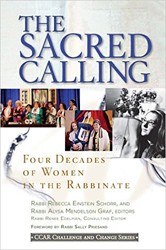
Celebrate Jewish Book Month with #30days30authors! JBC invited an author to share thoughts on #JewLit for each day of Jewish Book Month. Watch, read, enjoy, and discover!
Today, Rabbi Rebecca Einstein Schorr, co-editor of the National Jewish Book Award-winner The Sacred Calling: Four Decades of Women in the Rabbinate, writes about the importance of seeing herself, as a Jewish American girl, in the books she read as a child.
When I think back on my childhood, I remember time spent in a little house on a midwestern prairie, a secret garden in Yorkshire, and a quaint village on Prince Edward Island. My days were filled with stories of little women, teen sleuths, and adventurous siblings. In not one of these stories did I see myself.
As an American girl, I devoured the typical titles of the day, and I loved them. But as an American Jewish girl, I yearned to read stories that mirrored my own experience and that of my family.
Oddly enough, I had to go no further than downstairs. Because I grew up with a library in my own home!
When I was five years old, my father became the rabbi of a newly-formed shul. Though the congregation rented a variety of spaces for its classes and worship services, there was nowhere to house its burgeoning library. And so, my mother became the synagogue librarian and the book collection took up residence in my father’s study at home.
Suddenly, I had access to more books than any child could have wanted. Now, in addition to inhaling every Trixie Belden mystery, I shivered in the frigid cold of the Endless Steppe, stole away to a farmhouse attic in Holland, and left behind a pink rabbit in Berlin. To this day, whenever I eat a hot potato or crackers or penny candy, I am reminded of five sisters on the Lower East Side.
Jewish young adult literature, in addition to Jewish children’s literature, was critical for the development of my Jewish self. Alongside whatever books I saw in the public sphere, stories about children who celebrated MY holidays and ate MY foods normalized my life experience. Because as much fun as it must have been for Mary and Laura Ingalls to play with a balloon made from the tail of the pig that their Pa had just slaughtered, I couldn’t place my five-year-old great-grandmother in Kalusz in that scenario.
There were books about the immigrant experience, Tsarist Russia, the Holocaust, and Israel. A lot of tragedy between those covers. Too much? Perhaps. But for a young girl living in the safety of late 20th century America, these stories helped me understand how precarious Jewish life has been throughout the ages and to appreciate the freedoms afforded to us in a free society.
As a precocious reader, my attention soon turned to Potok, Wouk, and others. Belva Plain’s Evergreen series and Gloria Goldreich’s Leah’s Journey series were the natural successors to the immigrant stories of my youth. Even now, I gravitate towards stories of a Jewish nature or with a Jewish protagonist. That is not to say that I limit my selections as anyone familiar with my Goodreads updates knows that I enjoy a steady diet of books written by and about people of all races, faiths, cultures, and countries. In fact, I have set my personal reading intention for the past two years to focus on narratives that are radically different from mine in order to better understand the world in which I live.
And yet.
Sometimes, after listening in to the experiences of others, I’m just in need of the familiar. To remind myself of my cultural, ethnic, and religious home. And to know that I am not alone.
Ordained by the Hebrew Union College-Jewish Institute of Religion Rabbi Rebecca Einstein Schorr is a CLAL Rabbis Without Borders Fellow a contributing writer at Kveller.com and former editor of the newsletter of the Central Conference of American Rabbis. A sought-after speaker Rabbi Schorr speaks regularly about disability and the Jewish imperative for inclusion at such places as the 92nd St. Y the Academy for Jewish Religion (NY) a variety of synagogues and other community organizations; she was also a member of the 2013 Listen To Your Mother — Wilmington cast and 2015 Listen To Your Mother — Lehigh Valley cast where she spoke about the reality of rearing a child on the autism spectrum. Writing at her blog This Messy Life (www.rebeccaeinsteinschorr.com) Rabbi Schorr finds meaning in the sacred and not-yet-sacred intersections of daily life. Engage with her on Twitter @rebeccaschorr.



